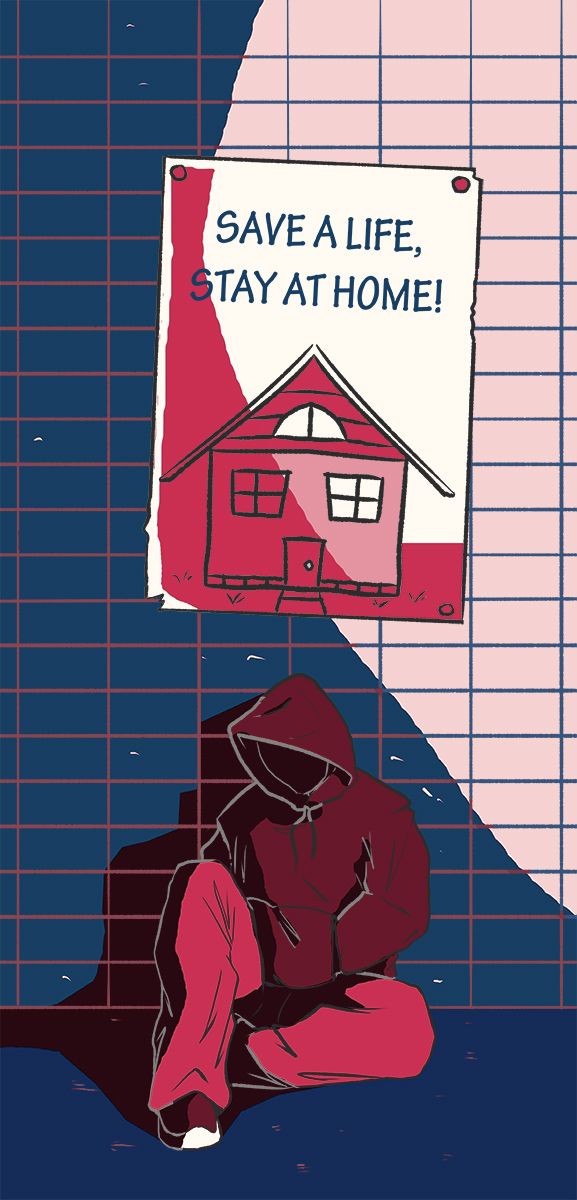Contracting COVID-19 won’t be a good time; some of the symptoms include a high fever, exhaustion, and a lot of coughing. The good news is that most people (around 80 per cent) recover without needing special treatment, so chances are you’ll be okay. However, you hold a greater risk for more severe outcomes, including hospitalization and death, if you’re over 65 years of age, you have a compromised immune system, or have any underlying medical condition. To protect ourselves and others we have been ordered to stay home. But what if you don’t have a home?
Street-entrenched people living in Abbotsford have very few options when it comes to finding a safe place to sleep and even fewer for self-isolating. Besides the handful of extra shelters that open during the extremely cold winter months, if you don’t get one of the 30 beds at the Salvation Army on Gladys Avenue or one of the 40 beds at the Lookout Shelter on Riverside, you’re probably out of luck. This is unless you are a homeless youth, in which case you’ve got a shot at one of the 12 beds at the Cyrus Centre, or if you’re a man over 50 you could get one of the 20 beds at 5&2 Ministries. Most homeless people set up encampments in parks since overnight camping became legal in 2016. Both taking a bed at a shelter and camping pose serious risks when it comes to COVID-19 transmission.
According to a resident in Downtown Eastside Vancouver, the coronavirus has the potential to “spread like wildfire” in these street-entrenched communities that lack the basic proper sanitation necessary to prevent transmission. The City of Vancouver has responded to the COVID-19 crisis in the Downtown Eastside by setting up hand-washing stations and ensuring single-room occupancy housing landlords and tenants ramp up their sanitation. Shelters like Union Gospel Mission are creating more space between beds by moving beds to different floors and are closing their dining hall, offering to-go meals instead. Safe-injection sites have reduced their number of tables to allow social distancing, which is leading many people to opt for using on the streets instead of waiting for a table.
The Salvation Army in Abbotsford is an invaluable resource for those struggling with addiction and homelessness. They have limited their meal services to just one to-go meal a day and showers and laundry services to only those staying at the shelter. They still have 30 beds open seven days a week for those lucky enough to get there on time and not showing any symptoms. However, they have experienced a sharp drop in donations in the past couple of weeks, along with Abbotsford’s two other essential non-profits: Archway Food Bank and Cyrus Centre.
Beyond shelters, the homeless population often use recreation centres, restaurants, churches, and other outreach centres to use the bathroom and wash their hands. All of these facilities have recently been closed, so where does one get access to hot, soapy water? It’s a necessity all the time, but even more crucial now, as street-entrenched people’s immune systems are compromised, and they often have underlying health conditions; therefore, a virus that most people can recover from could be potentially fatal to them, especially if there are no beds available for them to recover in.
As of March 24, two people who use the shelter system in Toronto have tested positive for COVID-19. The City of Toronto has already responded to the crisis by opening nine new facilities, with plans to open a 10th, to ensure more social distancing for those in need of shelter. As well, they have opened up an “isolation centre” for homeless people awaiting test results, and even booked hotel rooms for those needing to quarantine for 14 days due to exposure to the virus. The City of Vancouver has also booked hundreds of hotel rooms for the homeless to live in temporarily and has transformed two community centres into shelters.
Abbotsford must follow suit and make some serious changes on how they are handling this virus amongst the most at-risk populations. So far, an isolation shelter in Abbotsford for the homeless experiencing symptoms of COVID-19 is set to open “soon.” At the very least, the city can ensure there are hand-washing stations at hotspots and a dissemination of correct information about the disease to people with extremely limited access to the news and internet. If the city really cared about its homeless population it would open up a dozen more shelters to give a fighting chance to those whose life expectancy is already lower than the average person, but I may be asking for too much from Abbotford’s MP Ed Fast and Mayor Henry Braun who have done little to help this vulnerable population.
You can do your part by donating any food you have to spare, either produce or non-perishables, to the Archway Food Bank, Salvation Army, or the Cyrus Centre — some of the most needed food being soups, pasta, canned meat, and peanut butter. If you happen to have any extra cleaning supplies, hand sanitizer, or toilet paper on your hands, those would be useful to these essential services at a time like this as well. May this terrible situation bring out the best in us, not the worst.
Illustration: Kayt Hine/The Cascade
Andrea Sadowski is working towards her BA in Global Development Studies, with a minor in anthropology and Mennonite studies. When she's not sitting in front of her computer, Andrea enjoys climbing mountains, sleeping outside, cooking delicious plant-based food, talking to animals, and dismantling the patriarchy.


